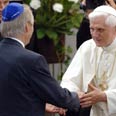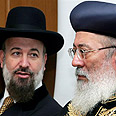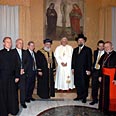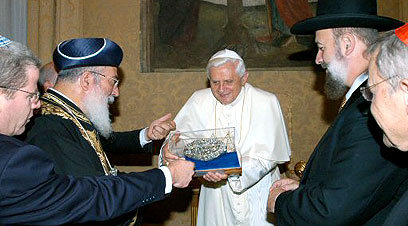



Israel’s chief rabbis on Thursday urged Pope Benedict to forcefully deplore the destruction of synagogues in Gaza by Palestinians after the Israeli withdrawal.
The two rabbis, Yona Metzger and Shlomo Amar, held some 45 minutes of private talks with the Pontiff at the papal summer residence at Castelgandolfo, south of Rome.

Pope meets with chief rabbis Amar (L) and Metzger (Photo: AFP)
”The discussion focused on the burning of the Gush Katif synagogues,” Metzger told Ynet following the meeting.
“We enlightened the Pope on the risks that such acts entail. We mentioned the trauma of ‘Crystal Night’ and warned that the next stage will be the burning of Jews.
“The second issue we discussed was our war against the rising anti-Semitism, mainly in Europe. In October the church is marking 40 years to the declaration exempting Jews of the responsibility for Jesus’ death. We asked that on this day a war on anti-Semitism be declared and that millions of believers will listen to anti-Semitism sermons in their churches.”
"We asked the Pope to talk about it (synagogues), to deplore it and to issue a strong appeal against it,” Metzger said at a news conference with Amar and other Israeli officials at a Rome airport after the meeting.
"We cannot allow synagogues, mosques and churches to be destroyed anywhere,” he said.
Metzger said the Pope agreed with the rabbis on the risk involved with the burning of synagogues.
“The Pope said he would call for condemning the burning down of holy sites. We felt a lot of sympathy and warmth. We were received in a family-like atmosphere, in contradiction to the otherwise rigid (Vatican) protocol,” he said.
“In conclusion the Pope said that everything must be done to eradicate terror and declared that the Vatican would be involved in this.”
'Terrorism is a cancer'
After the pullout, Palestinian crowds, including armed terrorists, destroyed several synagogues. Palestinian officials called the synagogues "symbols of 38 years of Israeli occupation," and said Israel should have destroyed them before withdrawing.
Prime Minister Ariel Sharon’s cabinet originally planned to destroy synagogues left standing in the 21 Gaza settlements that were evacuated and demolished. But the government backtracked under pressure from rabbis who said the demolition of Jewish houses of worship by Jews would be the greater sin.
Palestinians were furious at the decision to leave the synagogues intact, torn between wanting to erase emblems of Israel and uncomfortable at being seen destroying places of worship.
Metzger and Amar said they urged the Pope to speak out on the issue on behalf of believers of all faiths around the world.
"We learned from history that terrorism is a cancer. World War Two started with the burning of synagogues and then they burned people,” Metzger said.
'All holy places should be protected'
"Not only synagogues are holy, but so are all places where people find their affinity with their God," Metzger said.
The rabbis also urged the Pope to designate one day each year in which Catholics around the world would reflect on Catholic-Jewish relations and jointly discuss ways of combating anti-Semitism.
The rabbis held what they called a “very cordial and heartfelt” meeting with the Pope as part of commemorations marking the 40th anniversary of a landmark Vatican document called “Nostra Atate” (In Our Times).That document revolutionized relations between Vatican and the Jews by rejecting the notion of collective Jewish guilt for the death of Christ.
They said that they and the Pope “felt very comfortable with each other," and that they were certain that his papacy would build on the improved relations, a process begun with his predecessor John Paul II, who died last April.
'Looking forward to improving our relationship'
According to Oded Ben-Hur, Israel’s Ambassador to the Vatican, the Pope told the rabbis that he saw their visit as a "further step towards the process of building deeper religious relations between Christians and Jews."
Ben-Hur said the Pope told them that “acts of violence and terror” continued to cause immense sorry for anyone living in the Holy Land.
The rabbis repeated a standing invitation to the Pope to visit Jerusalem.
Sources in Italy’s Jewish community said the visit was held to put an end to the diplomatic incident that erupted between Israel and the Vatican.
In July the pope condemned the terror attacks in London, Turkey, Egypt and Iraq, but refrained from condemning the deadly attack in Netanya, which took place only a few days prior to his sermon.
The Foreign Ministry was quick to criticize the pope, saying he “intentionally” chose not to discuss the bombing and that this “legitimizes acts of terror against Jews.”
The Vatican, in turn, issued a harsh response, stating that Israel’s treatment of the Palestinians “does not always comply with human rights restrictions.”
The dispute was resolved in late August when Sharon sent a letter to the pope, calling him "a true friend of Israel.”
Ben Hur, brought the letter to the Vatican secretary of state, Cardinal Angelo Sodano, in what Ben Hur called an "amicable and intimate" meeting that signaled that "We definitely see this thing behind us and are looking forward to improving our relationship."
Nir Magal and Reuters contributed to this report















